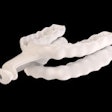
The dental services organization (DSO) model has been popular in recent years with more than 25 private equity firms investing in this growing healthcare niche. Ideally, the DSO model allows dentists to focus on professional patient care, while the management company handles the administrative and back office tasks of the practice.
In part 1 of this series, we reviewed four key considerations that frequently arise during the due diligence process. Here are five more to consider.
 Bart C. Walker, a partner at law firm McGuireWoods, concentrates on mergers, acquisitions, and healthcare regulatory compliance.
Bart C. Walker, a partner at law firm McGuireWoods, concentrates on mergers, acquisitions, and healthcare regulatory compliance.Noncompete enforceability and employment litigation
DSOs (and potential investors and lenders) must evaluate the enforceability of noncompete covenants against the sellers. For example, in Florida, a nondentist may not restrict the practice of dentistry by a dentist by entering into a noncompetition agreement. In California, noncompete provisions are generally not enforceable unless the provisions protect the goodwill of the practice after a sale.
Thus, if the noncompetition provisions are likely to be unenforceable in court, then the practice could face expensive legal fees and direct competition from its own dentists. Similarly, DSOs should be able to recognize potential employment issues with the practice's dentists, as often employment disputes lead to management relationships being scrutinized.
Billing procedures
Issues pertaining to medical necessity, overpayment, and fraud and abuse can lead to extensive penalties for the practice (potentially including exclusion from Medicaid). A purchaser should strongly consider doing a billing and coding audit of the practice before closing the transaction to determine if there are any irregularities or patterns of improper billing with respect to the practices being acquired.
 LauraLee Lawley, an associate with McGuireWoods, represents healthcare providers in mergers, acquisitions, divestitures, joint ventures, corporate governance, and regulatory matters.
LauraLee Lawley, an associate with McGuireWoods, represents healthcare providers in mergers, acquisitions, divestitures, joint ventures, corporate governance, and regulatory matters.For example, often practices will bill services under certain credentialed or enrolled providers, but the services were in fact done by another provider not authorized to bill for such services. Similarly, the dental practices may bill a certain service improperly under a facility fee, or bill for certain restricted ancillary services (for example, labs, imaging, and dental appliances). Finally, investors and lenders should investigate out-of-network billing practices and whether the dental practice routinely waives co-pays or deductibles to induce patients to use their services. These types of activities may be restricted by state or federal law.
HIPAA compliance
Dental practices are "covered entities" under HIPAA and thus have privacy and security obligations with respect to their patients' protected health information (PHI). Dental practices may not have robust HIPAA policies and procedures or business associate agreements with third parties who handle their patients' PHI. Similarly, the practice may have federal and state liabilities and reporting obligations related to breaches of PHI.
Licenses and professional liability
Investors or lenders should be aware of any claims against the dental practice or the licenses of the dentists of the practice. Further, investors or lenders should verify that the dental practice has all of the necessary licenses, permits, and registrations. For example, in Illinois, a professional services corporation is required to register with the state before it can operate an office. Similarly, some states have licenses or registrations required for radiation-emitting x-ray equipment, which is found in most dental offices.
 John Saran, an associate with McGuireWoods, focuses on healthcare mergers and acquisitions, joint ventures, and finance.
John Saran, an associate with McGuireWoods, focuses on healthcare mergers and acquisitions, joint ventures, and finance.Payor mix
Finally, investors and lenders must understand the payor mix of the dental practice (that is, what percentage of the practice's revenue comes from Medicaid versus commercial payors versus self-pay or cash). A practice that is Medicaid-heavy should be mindful of the many federal regulatory requirements to which it is subject and the increased scrutiny of Medicaid providers.
Further, it is important to understand whether the practice is in network or out of network with various third-party payors. Not only will this information help explain the cash flow of the practice, it will also allow a purchaser to explore different network options to optimize reimbursement. Finally, it is critical that an investor or lender understands whether the dentist or the practice itself holds the payor agreements. If the dentist holds all of the payor agreements, then he or she could bring the practice's ability to collect reimbursement to a halt in the event of an employment dispute or challenge to the DSO structure.
Barton C. Walker, a partner at law firm McGuireWoods in Charlotte, NC, concentrates on mergers, acquisitions, and healthcare regulatory compliance. His practice includes advising healthcare providers, as well as equity sponsors and lenders, on the healthcare industry.
LauraLee Lawley is an associate in the Charlotte office of McGuireWoods who practices in the healthcare industry, representing healthcare providers in mergers, acquisitions, divestitures, joint ventures, corporate governance, and regulatory matters.
John Saran, an associate in McGuireWoods' Chicago office, focuses on healthcare mergers and acquisitions, joint ventures, and finance involving hospitals, ambulatory surgery centers, nephrology groups and dialysis facilities, urgent care centers, physician and dental practices, health IT companies, and medical device companies.
McGuireWoods is the eighth largest healthcare practice in the U.S., according to the American Health Lawyers Association in its annual Top Honors rankings. For more information, visit www.mcguirewoods.com.
The comments and observations expressed herein do not necessarily reflect the opinions of DrBicuspid.com, nor should they be construed as an endorsement or admonishment of any particular idea, vendor, or organization.



















